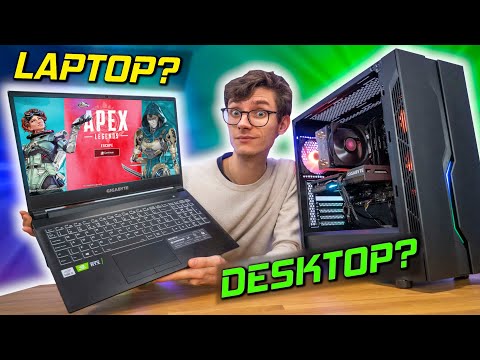How to Choose: Gaming Laptop vs. Desktop PC 2025

Strong 8k brings an ultra-HD IPTV experience to your living room and your pocket.
Choosing between a gaming laptop and a desktop PC is a significant decision that hinges on various factors, including performance, portability, cost, upgradeability, and personal preferences. This comprehensive guide by Tr2game into these aspects to assist you in making an informed choice tailored to your gaming needs.
1. Performance
Desktop PC: Desktops are renowned for superior performance capabilities. They can accommodate high-end CPUs and GPUs, offering enhanced processing power and graphical fidelity. The spacious chassis allows for advanced cooling solutions, enabling components to operate at optimal speeds without thermal throttling. This results in higher frame rates and better overall gaming experiences, especially in resource-intensive games.
Gaming Laptop: Modern Clevo PA71 gaming laptops have made significant strides in performance, with some models rivaling mid-range desktops. However, due to size constraints and thermal limitations, they often feature mobile versions of GPUs and CPUs, which may not match the raw power of their desktop counterparts. While capable of running most games smoothly, they might struggle with the most demanding titles at maximum settings.
2. Portability
Desktop PC: Designed for stationary use, desktops are not intended for portability. They require a dedicated space and are best suited for a permanent gaming setup. Transporting a desktop involves moving multiple components, including the monitor, keyboard, and mouse, making it impractical for on-the-go gaming.
Gaming Laptop: The hallmark of gaming laptops is their portability. They integrate the monitor, keyboard, and battery into a single unit, allowing gamers to play anywhere. This is particularly advantageous for individuals who travel frequently or prefer gaming in different locations. However, it's important to note that gaming laptops are generally heavier and bulkier than standard laptops due to the additional hardware and cooling systems.
3. Cost
Desktop PC: Desktops often provide a better price-to-performance ratio. Building a custom desktop allows for component selection that fits your budget, often resulting in savings compared to pre-built systems. Additionally, desktops can be upgraded over time, spreading out costs and extending the system's lifespan.
Gaming Laptop: Gaming laptops tend to be more expensive for equivalent performance levels. The premium is due to the engineering required to fit powerful components into a compact, portable form factor. While there are budget-friendly gaming laptops available, they may not offer the same performance or longevity as their desktop counterparts.
4. Upgradeability
Desktop PC: One of the significant advantages of desktops is their upgradeability. Users can easily replace or add components such as GPUs, CPUs, RAM, and storage drives. This flexibility allows desktops to keep pace with technological advancements and adapt to changing gaming requirements.
Gaming Laptop: Upgrade options for laptops are limited. Typically, only RAM and storage drives can be upgraded, and even these are sometimes soldered to the motherboard in ultra-slim models. The GPU and CPU are usually integrated and cannot be replaced, limiting the laptop's ability to adapt to future gaming demands.
5. Display and Peripherals
Desktop PC: Desktops require external monitors, keyboards, and mice, offering the flexibility to choose peripherals that suit your preferences. This allows for larger displays, higher resolutions, and specialized gaming accessories that can enhance the gaming experience.
Gaming Laptop: Laptops come with built-in displays and keyboards, which, while convenient, may not match the quality of external peripherals. Screen sizes are typically limited to 15-17 inches, and while some models offer high-refresh-rate displays, they may lack the color accuracy or resolution of dedicated monitors. However, gaming laptops can be connected to external monitors and peripherals when stationary, providing a desktop-like experience when needed.
6. Cooling and Noise
Desktop PC: The larger form factor of desktops allows for more efficient cooling solutions, including multiple fans and liquid cooling systems. This effective heat dissipation enables components to run at higher speeds without overheating, often resulting in quieter operation even under heavy loads.
Gaming Laptop: Due to compact designs, laptops have limited space for cooling, which can lead to higher temperatures and increased fan noise during intensive gaming sessions. Prolonged exposure to high temperatures can also impact the longevity of the internal components.
7. Longevity
Desktop PC: Desktops generally have a longer lifespan due to their upgradeability and superior cooling systems. The ability to replace outdated components allows desktops to remain relevant as technology evolves, providing a sustainable gaming solution over the long term.
Gaming Laptop: The limited upgrade options and potential for higher thermal stress can result in a shorter lifespan for gaming laptops. As new games require more advanced hardware, a laptop's fixed components may become obsolete, necessitating the purchase of a new system sooner than a desktop would require.
8. Use Case Scenarios
Desktop PC: Ideal for gamers who prioritize performance, customization, and a permanent gaming environment. Desktops are well-suited for individuals who engage in resource-intensive gaming, content creation, or streaming, where maximum performance and the ability to upgrade are essential.
Gaming Laptop: Best for gamers who value portability and the convenience of an all-in-one system. Laptops are suitable for those who need a versatile device for gaming, work, or study, and who may not have a dedicated space for a desktop setup.
9. Space and Aesthetics
Desktop PC: Desktops require a dedicated space and can be customized with various case designs, lighting, and setups to match personal aesthetics. However, they occupy more physical space and may contribute to cable clutter if not managed properly.
Gaming Laptop: Laptops offer a more minimalist setup, reducing the need for extensive desk space and cable management. Their sleek designs can complement modern aesthetics, and they can be easily stored away when not in use, freeing up space.
Note: IndiBlogHub features both user-submitted and editorial content. We do not verify third-party contributions. Read our Disclaimer and Privacy Policyfor details.







